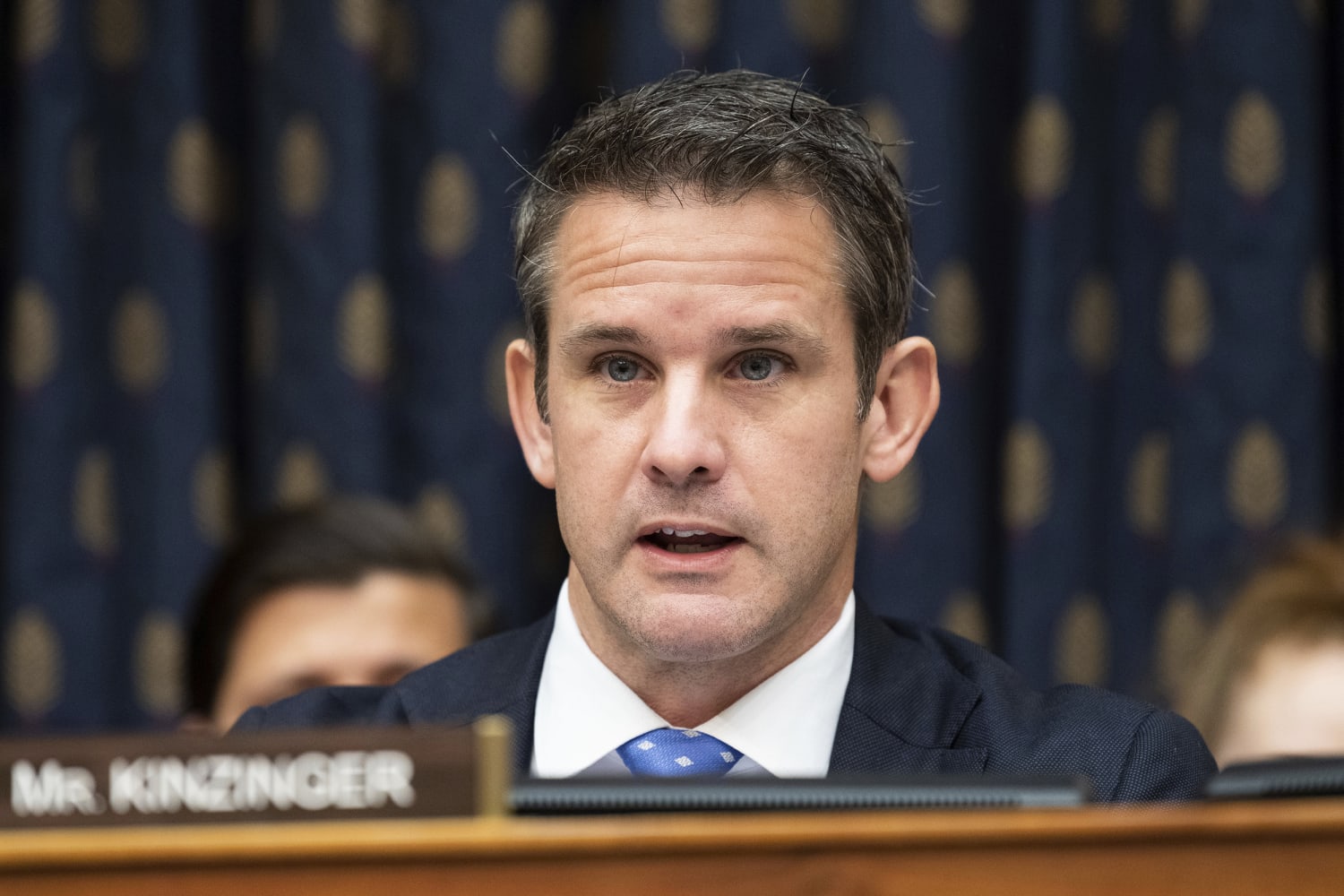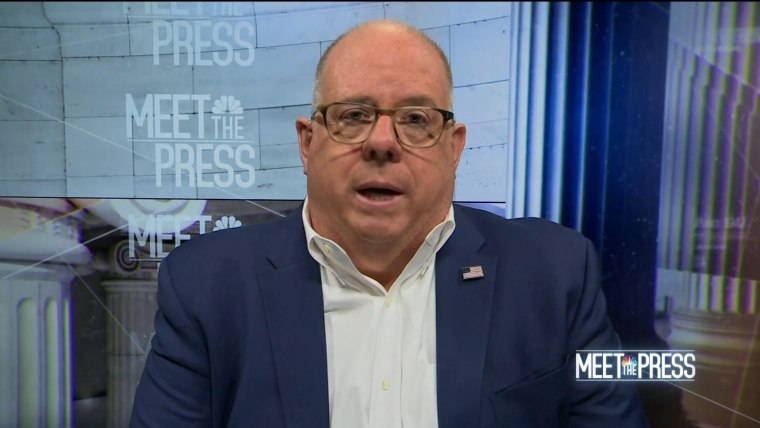WASHINGTON — Illinois Rep. Adam Kinzinger became the first Republican member of Congress to support President Trump’s removal from office, as calls mount primarily among Democrats for Trump to be removed for ginning up the rioters that broke into the U.S. Capitol building on Wednesday.
According to an NBC News count, more than 100 House and Senate Democrats have called for either impeaching President Trump or enacting the 25th Amendment to remove him from office. Kinzinger is the only Republican, and the count includes 101 members of the House and seven Senators.
The highest-ranking Democrat to join the call is Senate Minority Leader Chuck Schumer, who did so in a statement Thursday morning that said he supports either method of removing Trump.
Many have done so in bulk — all 17 Democrats on the House Judiciary Committee wrote a letter to Vice President Pence asking him to invoke the 25th Amendment.
“Section 4 of the 25th Amendment to the U.S. Constitution provides the vice president and a majority of sitting Cabinet secretaries with the authority to determine a president as unfit if he ‘is unable to discharge the powers and duties of his office,’” the letter read.
They added, “President Trump’s willingness to incite violence and social unrest to overturn the election results by force clearly meet this standard.”
The calls haven’t just come from lawmakers — the head of the National Association of Manufacturers called for Pence to invoke the 25th Amendment in a statement,
How Democrats overperformed in the Senate runoffs from November
WASHINGTON — With Democratic Rev. Raphael Warnock projected to win and Democrat Jon Ossoff in the lead, the story from Tuesday’s Georgia Senate runoff is that Democrats improved their vote margins in many of Atlanta’s most-populous counties.
That dynamic is especially true in counties with a significant Black population, like Clayton and DeKalb, where they hit or exceeded President-elect Joe Biden’s winning margins from November.
The easiest comparison to make is in the race between Republican Sen. David Perdue and Ossoff because the two faced off one-on-one on November’s ballot and again in January (the special election between Warnock and GOP Sen. Kelly Loeffler had a jungle primary in November, with all candidates on one ballot regardless of party).
With at least 95 percent or more of the expected vote in from each county, here’s a look at some of those margins in November and where the margin stands now:
The Atlanta suburbs
- Fulton (the most vote-rich county in the state): In November, Ossoff won 69.8 percent to Perdue’s 28.1 percent. In the runoff, Ossoff is at 71.6 percent to Perdue’s 28.4 percent.
- Gwinnett (outside Atlanta’s city limits): In November, Ossoff won 56.8 percent to Perdue’s 40.6 percent. In the runoff, Ossoff is at 59.9 percent to Perdue’s 40.1 percent.
- Cobb (another Atlanta suburb): In November, Ossoff won 54 percent to Perdue’s 43.4 percent. In the runoff, Ossoff is at 55.8 percent to Perdue’s 44.3 percent.
- DeKalb (contains about 10 percent of Atlanta; majority black): In November, Ossoff won 81.2 percent to Perdue’s 16.8 percent. Now, Ossoff is at 83.3 percent to Perdue’s 16.7 percent.
- Henry (Atlanta suburb): In November, Ossoff won 58.8 percent and Perdue won 39 percent. In the runoff, Ossoff is at 61.3 percent to Perdue’s 38.7 percent.
- Clayton (was represented by the late Democratic Rep. John Lewis): In November, Ossoff won 84.4 percent of the vote to Perdue’s 13.4 percent. In the runoff, Ossoff is at 88.4 percent to Perdue’s 11.6 percent.
- Douglas (another Atlanta suburb that was reliably GOP until 2008): In November, Ossoff won 61.1 percent to Perdue’s 36.5 percent. Now, Ossoff is at 64.7 percent to Perdue’s 35.3 percent.
Savannah
- Chatham (Georgia’s most populous county outside of Metro Atlanta): In November, Ossoff won 57.6 percent of the vote here to Perdue’s 40.2 percent. In the runoff, Ossoff is at 59.1 percent to Perdue’s 40.9 percent
The big, GOP-leaning counties
- Cherokee (exurban Atlanta): In November, Perdue won 69.2 percent to Ossoff’s 27.8 percent. In the runoff, Perdue is at 70.6 percent to Ossoff’s 29.4 percent.
- Forsyth (exurban Atlanta): In November, Perdue won 66.8 percent of the vote here to Ossoff’s 30.6 percent. In the runoff, Perdue is at 68.1 percent to Ossoff’s 31.9 percent.
- Hall (exurban Atlanta): In November, Perdue won 71.1 percent to Ossoff’s 26.2 percent. In the runoff, Perdue is at 72.4 percent to Ossoff’s 27.6 percent.
- Paulding (exurban Atlanta): In November, Perdue won 63.3 percent of the vote to Ossoff’s 34 percent. In the runoff, Perdue is at 63.4 percent to Ossoff’s 36.6 percent.
- Columbia (outside of Augusta): In November, Perdue won 62.9 percent to Ossoff’s 34.7 percent. In the runoff, Perdue is at 63.3 percent to Ossoff’s 36.7 percent.
Georgia’s runoff rules are in part thanks to state’s segregationist past
WASHINGTON — With the 2020 race for the Senate heading into overtime eight weeks after Election Day, casual observers may be asking themselves: Why?
Both Senate races in Georgia headed to runoffs because no candidate in either contest received more than 50 percent of the vote in November. But the state’s election laws are unique in the United States, and their origins — at least in part — lie in the South’s segregationist past.
While several other states require candidates to receive 50 percent plus one in many federal and state primary contests, Georgia is alone in requiring that share for both primaries and subsequent general elections.
The law requiring the threshold was signed in 1964, a year after being introduced by a Democratic state lawmaker named Denmark Groover from Macon, Ga.
Groover was a vocal segregationist also known for his work to include the Confederate flag in a redesign of the state flag of Georgia, in defiance of federal desegregation efforts.
Groover understood the electoral power of the Black vote, having lost a race in 1958 when his strength with white voters was outmatched by the 84 percent of the Black vote that went for his opponent.
Here’s what an Interior Department report on voting rights, published in 2007, had to say about Groover’s reaction to that loss:
“The Macon politico blamed his loss on ‘Negro bloc voting.’ … Groover soon devised a way to challenge growing black political strength. Elected to the House again in 1962, he led the fight to enact a majority vote, runoff rule for all county and state contests in both primary and general elections.”
Groover was a Democrat before a massive political realignment in the South scrambled traditional racial political alliances.
Now, with Black voters firmly in the Democratic coalition, the 50 percent plus one rule has largely been a stumbling block for the party.
In fact, since 1988 — the first year for which Secretary of State records are available — Democrats have won just one of eight statewide contests that went to a runoff in Georgia, despite receiving more votes in the initial general election contests in several cases.
The only race they won: A Democrat’s campaign for Public Service Commissioner in 1998. The same candidate later switched parties and will also compete in a runoff on January 5 — as a Republican.
Georgia Senate elections set new ad spending records powered by massive outside spending
WASHINGTON — Election day in Georgia’s Senate runoffs is Tuesday, and both races have already seen enough TV and radio spending to become the two most expensive Senate contests (by ad spending) in U.S. election history.
Combining runoff spending with the general election, both contests (GOP Sen. David Perdue v. Democrat Jon Ossoff, and GOP Sen. Kelly Loeffler v. Democrat Raphael Warnock) easily clear the record of $251 million spent on the airwaves in North Carolina’s 2020 Senate race.
The Perdue-vs.Ossoff race is set to have about $382 million spent on TV and radio, and the Loeffler-vs.-Warnock race is set to have about $284.3 million in TV and radio spending (this total includes money booked to be spent on Monday and Tuesday), per AdImpact.
The majority of that spending has come in the compressed runoff window — $250 million in the Perdue/Ossoff race and $235 million in the Loeffler/Perdue contest.
Another trend that’s common across both races since the runoff began is that Democratic candidates have been consistently outspending their GOP rivals on the airwaves, but GOP outside groups have more than filled the void to give Republicans a final spending edge.
Through Tuesday, Ossoff is expected to spend about $87 million to Perdue’s $50 million, compared to Warnock’s $70 million and Loeffler’s $50 million. But in both races, GOP outside groups have outspent Democratic outside groups by more than 3 times — with Democratic groups spending about $26 million in each race to the GOP’s more than $80 million.
Biden taking longer than most former presidents to name his attorney general
WASHINGTON — President-elect Joe Biden still hasn’t announced his attorney general designee. With Election Day being 62 days ago, Biden is on track to announce his attorney general pick later than the last 7 seven presidents.
According to Senate confirmation records that date back to former President Jimmy Carter’s Cabinet picks, Biden has taken longer to announce his attorney general designee than most. Prior to Biden, Carter had the longest gap (48 days) between Election Day and announcing his attorney general designee.
Here’s how that looks by the numbers:
Biden’s incoming press secretary Jennifer Psaki told reporters to expect more Cabinet announcements this week, but didn’t clarify if that would include Biden’s designee for attorney general. However, outgoing Sen. Doug Jones, D-Ala., Obama Supreme Court nominee Merrick Garland and former deputy attorney general and acting attorney general Sally Yates are all rumored to be under consideration.
Biden also hasn’t named his picks to lead the Commerce and Labor departments, the Small Business Administration and the CIA director.
Georgia Gov. Brian Kemp dismisses Trump’s call to resign
LAWRENCEVILLE, GA. — Georgia Gov. Brian Kemp dismissed President Trump’s call for him to resign on Wednesday and said that any pressure to challenge the 2020 presidential election results should be focused in Washington D.C., not in Georgia.
“There is a constitutional and legal process that is playing out, and I’m very comfortable letting that process play out,” Kemp told reporters. “But that horse has left the barn in Georgia and it’s headed to D.C. right now. The next vote is going to be there, not here. So people need to focus on the vote that is happening here.”
Trump tweeted on Wednesday that Kemp should resign from office and called the governor an “obstructionist”.
Kemp said that his constituents would rather him be focused on distributing the Covid-19 vaccines and helping keep the Republican Senate majority, not on the president’s tweets.
“That’s what everybody else, quite honestly, should be focused on while the rest of the process is playing out,” Kemp said.
He added, “I’ve supported the legal process that [the president] or any other campaign can go through in this state, but at the end of the day I also have to follow the laws and the Constitution.”
Ahead of the Jan. 5 Georgia Senate runoffs, Republican Sen. David Perdue said on Wednesday that Trump’s criticism of Kemp and other Georgia officials wasn’t making his race more difficult.
“I think that what the president is doing is exercising his rights,” Perdue said during a Fox News interview.
Perdue also defended the president’s claims of voter fraud in Georgia.
“We know there are potentially some improprieties there and the president has done nothing but asking for some questions to be answered,” Perdue said.
Georgia’s secretary of state’s office released a signature match audit of Cobb County’s absentee ballots which found “no fraudulent absentee ballots”.
Kemp said he would continue to support both Perdue and fellow Republican Sen. Kelly Loeffler, but hasn’t been invited to President Trump’s Jan. 4 Georgia rally.
“I don’t want to wake up on January the sixth and wonder what else I should have done. I’m doing everything I can with the time that I have to support sending them back up there,” Kemp said.
Georgia breaks runoff turnout record for Senate races
WASHINGTON — Georgians have already broken the state’s runoff turnout record in the dual Senate runoffs that will decide control of the U.S. Senate, new numbers show Tuesday, a mark reached about a week before the day of the election.
More than 2.3 million voters have cast their ballots, with more than 800,000 voting absentee by mail and 1.5 million voting early, in person, according to the Georgia Secretary of State’s office. The previous runoff turnout record was set in 2008, when Georgians cast 2.137 million total ballots in the entire election.
More than 78,000 Georgians who did not vote in the general election have already voted in the runoff race, according to the analysis of early vote data by the Democratic political data firm TargetSmart. Tom Bonier, TargetSmart’s CEO said Monday that a majority of those voters were voters of color, with African-Americans making up a strong portion.
Democrats Jon Ossoff and Rev. Raphael Warnock have been holding GOTV rallies targeting key constituencies within the Black, Latino, and Asian Americans and Pacific Islander communities, as well as young voters with key surrogates like President-elect Joe Biden and former President Barack Obama.
Republicans have been rallying their supporters with key figures as well, and President Donald Trump will rally for Republicans Sen. David Perdue and Sen. Kelly Loeffler on Jan.4 (the day before the election) in the northwest Georgia congressional district of Rep.-elect Marjorie Taylor Green, a Republican who has been amplifying Trump’s unsubstantiated claims of massive voter fraud.
Some Republicans are anxious that Trump’s false claims and repeated undercutting of the state’s election results could turn off voters the party needs in January.
The Georgia Secretary of State’s office tells NBC News 3,283 absentee ballots have been rejected as of Tuesday morning. Those voters have until the Friday after Election Day to cure their ballots.
Andrew Yang files paperwork for New York City mayoral bid
WASHINGTON — Former Democratic presidential hopeful Andrew Yang has filed paperwork with New York City to run for mayor, marking the next political chapter for the entrepreneur who mounted an underdog bid for president in 2020.
Yang, who had been reportedly eyeing a bid for New York City mayor, filed on Wednesday with the city’s Campaign Finance Board. An affiliated committee, Yang For New York, which is associated with a top Yang aide, also registered with the city board.
Yang has not yet commented on the filing, but a source close to Yang told NBC that the filing is “just procedural” and that “no decision has been made,” but that since Yang was “seriously considering it” that filing “was the necessary next step.”
With New York City Mayor Bill de Blasio term-limited, the mayoral race is expected to be wide open.
New York Democratic Rep. Max Rose, who lost his re-election bid this year, is exploring a bid. Other prominent candidates include New York City Comptroller Scott Stringer, former de Blasio aide and police oversight board head Maya Wiley (a former MSNBC legal analyst), former Housing and Urban Development Sec. Shaun Donovan, Brooklyn Borough President Eric Adams and New York City Sanitation Commissioner Kathryn Garcia.
Yang announced his 2020 presidential campaign in late 2017, far before almost any other major candidate. And while he was initially viewed as a long-shot, his campaign caught a jolt of momentum as he pitched his plan for all Americans to receive monthly $1,000 checks as part of a universal basic income.
He ultimately dropped out of the race after the New Hampshire primary and started a nonprofit aimed at advancing his ideas, including universal basic income. He endorsed President-elect Joe Biden in March.
For the first time, New York City will be running the mayoral primary races with ranked-choice voting, which allows voters to rank a slate of candidates. If no candidate wins a majority vote, the votes for the lowest-finishing candidates will be reallocated to their next preferred candidate, with the process repeating until one candidate hits a majority.
DNC will elect new chair at Jan. 21 virtual Winter Meeting
WASHINGTON — The Democratic National Committee will pick its new chair during its virtual Winter Meeting on Jan. 21, NBC News has learned, one day after President-elect Joe Biden is inaugurated.
The party informed committee-members today of the date of its Winter Meeting, one of the seasonal gatherings where it conducts party business, a DNC aide told NBC.
The centerpiece of the Winter Meeting will be the party’s officer elections, which will include the election of a new chair. Current DNC Chairman Tom Perez has said he will not serve another four-year term, opening the vacancy at the top of the organization.
With Biden entering the White House, he’ll have significant sway over who leads the party. While there are no official candidates yet, former South Carolina Senate nominee Jaime Harrison has expressed openness to running, telling The Washington Post last month “If that’s something that they are interested in me doing, I’ll definitely take a good look.”
Harrison proved to be a strong fundraiser during his failed bid for the Senate this past cycle, raising more money in a single fundraising quarter than any candidate in American history. He ultimately lost that race to Republican Sen. Lindsey Graham by about 10 points.
The Democrat has sought to lead the party before — he ran for DNC chair after the 2016 election, and Perez tapped him to be the DNC’s associate chairman after that election. Before that, he led the South Carolina Democratic Party.
And he’s close with one of Biden’s key allies, South Carolina Democratic Rep. James Clyburn, after having worked as one of his top aides in the House.
While other DNC seasonal meetings include various caucus forums and committee work, including the work that helps to shape the party’s rules, the party will just focus on electing its new officers during the January session. On top of the chairperson’s race, the party will also be electing vice chairs, secretaries, treasurers and national finance chair.
Perez will leave the party after one term as its leader, in which the party won back both the House and the White House in the 2018 and 2020 elections respectively. The former Labor Secretary during the Obama administration, he inherited a DNC in turmoil after the party’s loss in the 2016 presidential election, as well as after hacked emails showing some key party leaders deriding Vermont Independent Sen. Bernie Sanders were released.
Perez faced criticism from some Democrats and DNC members for the party’s fundraising in the early years of his tenure. And even as the party won back the White House in November, Democrats lost ground in the House and underperformed its targets in the Senate (control of that body will now be decided in the two runoff Senate elections in Georgia).
But Perez and top Democrats have pointed to the steps taken to dig the party out of its 2016 hole to help its eventual nominee, Biden, defeat President Trump, including investments in organizing staff and its voter file, emphasizing targeting key constituencies, and helping to fund expansive voting-rights litigation effort across the country.
Iowa Democrat Rita Hart files challenge to six-vote defeat in the House
WASHINGTON — Iowa Democrat Rita Hart is officially contesting Iowa’s Second Congressional District election, asking the House of Representatives to recount ballots and arguing that she would have won but for lawful votes left uncounted.
Hart ran against Republican state Sen. Mariannette Miller-Meeks in November’s election, and the state’s election officials certified the Republican’s narrow victory, by just six votes, late last month.
But in an official “notice of contest” filed with the House, Hart’s campaign claims it has identified “at least 22 lawful ballots” that were left out of the count (the vast majority of those votes, but not all, were for Hart). The campaign says that if those votes were correctly added to the tally, the Democrat would have won.
The request goes on to request a “hand recount of every ballot” to be sure all votes are captured.
“We believe that in a democratic system, that it is important that this process be abided by, and that every vote be counted. It is better to get it done right than to simply ignore the fact that voters have been disenfranchised because it might be more convenient,” Mark Elias, the Hart campaign’s lawyer, said in a briefing with reporters.
Miller-Meeks and fellow Republicans slammed the decision.
“Every vote has been counted under Iowa law, and recounted under Iowa law. The canvas of votes was approved unanimously by a bipartisan board, and certified by the state of Iowa. I’m proud that a narrow majority of you elected me,” Miller-Meeks said in a video statement Tuesday.
“Unfortunately, Rita Hart now wants Washington politicians to override the will of Iowa voters and disenfranchise hundreds of thousands of Iowa voters.”
And in a statement, National Republican Congressional Committee spokesman Bob Salera called the decision to petition the House a “naked power grab.”
The challenge is the latest twist in what’s slated to be one of the tightest House races in modern American history. First, the state’s unofficial results found Hart 47 votes behind Miller-Meeks, but the margin narrowed to six votes after a recount requested by Hart.
Ultimately, the House has control over who it decides to seat, so it will be up to the Democratic-controlled body as to whether to investigate and ultimately decide who should be seated. One high-profile example of the process happened in 1984, when the House conducted a recount that ultimately overturned the results in Indiana’s 8th Congressional District.
The request for the House to weigh in comes as Democrats have criticized President Donald Trump for claiming, without evidence, that he is the rightful winner of the 2020 presidential election, even despite all votes being certified and electoral votes already cast.
The 176-page challenge from the Hart campaign specifically identifies ballots the campaigns believe should have been counted, and includes affidavits from those involved in the counting process, as well as from voters. The campaign says the votes weren’t counted for a variety of reasons, including an error by an election worker, a misplaced signature, and ballots not being sealed properly.
Asked about the GOP criticism of bringing the challenge to the Democratic-controlled House, Elias said that the move wasn’t partisan, but that they were only following the process laid out in federal law to contest federal elections. And he added that while the ballots he identified were not counted for a handful of reasons, he’s not suggesting any animus.
“Elections are, under the best of circumstances, challenging to administer. In the middle of a pandemic, they are even more challenging,” he said.
Larry Hogan celebrates bipartisan Covid relief deal in new ‘No Labels’ ad
WASHINGTON — Maryland RepublicanGov. Larry Hogan is appearing in a new ad campaign applauding the “bipartisan leadership” that led to Congress passing a Covid-relief deal over months of stalemate, NBC News has learned.
The new ad campaign is from No Labels, the moderate advocacy group that champions bipartisanship, which named Hogan its national co-chairman earlier this month.
In the ad — on which No Labels says it will spend $350,000 to run on cable and digital across the country — Hogan pitches a hopeful message about Congress’ way forward, calling the agreement “how our government needs to work,” by putting partisan “labels aside and put the country first.”
“This is what real, bipartisan leadership looks like. This relief package will save lives, save businesses and save jobs. It’s what Americans have been waiting for,” Hogan says in the ad.
“So many people are hurting, and I know it’s hard to see our way through this. But if we unite as Americans and work together, I promise you, we can come out of this stronger and better than ever.”
Lawmakers have been struggling to reach a consensus on a new round of relief for months, but broke the logjam over the weekend. But a deal materialized over the last few weeks, and Congress ultimately passed an almost $900 billion relief package late Monday. The deal includes new stimulus checks and an extension of the expanded unemployment benefits, and also provides more funds for areas including the vaccine rollout, for schools and for businesses.
No Labels supports the House Problem Solvers Caucus, a bipartisan group that has been pushing for compromise in the House on Covid relief and other issues. A handful of the top negotiators in the latest round of Covid relief in the Senate are allies of the group too.
In a statement to NBC, Ryan Clancy, the chief strategist for No Labels, applauded those allies who “kept working” when “congressional leaders weren’t talking, and a deal seemed impossible” because “they knew the stakes and that millions of Americans desperately needed help.
“This deal simply would not have happened if not for the work of this group. So No Labels wanted to highlight this rare and welcome act of bipartisanship but just as important, to let Americans know we can see a lot more of this in 2021 if we demand it,” Clancy said.
The new ad appearance comes in the early weeks of Hogan’s term at the helm of the organization. The Maryland Republican has sought to stake out an independent lane in recent years within a GOP dominated by support for President Donald Trump.
The former head of the National Governor’s Association, Hogan has been out-front on his state’s response to the coronavirus pandemic, and told “Meet the Press” in July that he’s a “lifelong Republican who has not been afraid to stand up and disagree with the president on any number of issues.”
“I don’t know what the future holds in November, but I know that the Republican party is going to be looking at what happens after President Trump and whether that’s in four months or in four years. And I think they’re going to be looking to, “How do we go about becoming a bigger tent party?” he said at the time.
Source: | This article originally belongs to Nbcnews.com












